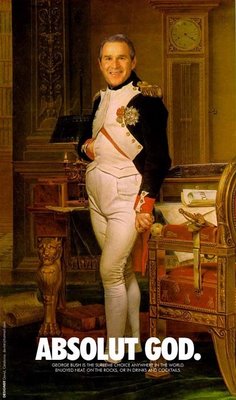Whippin' Congressional Behinds & Keepin' 'Em In Line: The Unimatary Excessutive

Just in case Congress hasn't gotten the message yet--who's in charge, that is-- over the weekend the FBI raided the Congressional offices of a Louisiana Democrat at the Justice Department's behest.
Nobody's likely to come to the Democrat's defense on the merits, because it certainly seems that he's been doing wrong (as politicians in Louisiana are notoriously wont to do), but that's really beside the point. The point is: the arrogation of executive branch to itself power over Congress, & woe to those who fall out of favor, or were already on the wrong side as far as Bush & Gonzales are concerned.
According to indie press group Consortium News,
"Over the past weekend, George W. Bush and his Justice Department signaled to the U.S. press corps and Congress that they are not beyond the reach of Bush’s 'plenary'–or unlimited-powers as Commander in Chief or his authority as 'unitary executive,' deciding what laws to enforce and how.
"On May 21, Attorney General Alberto Gonzales told ABC’s “This Week” that news organizations like the New York Times could be prosecuted for publishing classified information about the 'war on terror,' such as the disclosure of Bush’s secret program of warrantless wiretapping inside the United States.
"The night before that TV interview, the FBI conducted an extraordinary raid on the Capitol Hill office of Democratic Rep. William J. Jefferson of Louisiana as part of a bribery investigation, raising bipartisan concerns about the Executive Branch trampling congressional rights and intimidating members of Congress."
Even House Speaker Dennis Hastert, Bush loyalist, got the message: "The actions of the Justice Department in seeking and executing this warrant raise important Constitutional issues that go well beyond the specifics of this case,” he said.
"Insofar as I am aware, since the founding of our Republic 219 years ago, the Justice Department has never found it necessary to do what it did Saturday night crossing this Separations of Powers line, in order to successfully prosecute corruption by members of Congress,” Hastert said. [Washington Post, May 23, 2006]
Consortium News goes on to tie the disparate bits of info together & connect the dots:
"The implicit chilling effect on congressmen and senators, who might otherwise consider holding Bush accountable for his own abuses, could not be missed.
"Gonzales delivered a similar warning to the news media, that the administration is dusting off the 89-year-old Espionage Act as a legal justification for prosecuting journalists and their sources when stories appear citing classified information, such as the New York Times article about Bush authorizing wiretaps of some American communications without court warrants."
Gonzales played coy on the topic of prosecuting journalists over the publication of leaks of classified information, though the story broke last week that one of the fringe benefits of amassing a huge database of public citizens' phone records (including calls made by them) is the fact that those reporters' calls can be, & probably will, according to Gonzales, tracked to determine the government sources of the leaks.
“'We are engaged now in an investigation about what would be the appropriate course of action in that particular case, so I’m not going to talk about it specifically,' Gonzales said. But he cited 'some statutes on the book which, if you read the language carefully, would seem to indicate that that is a possibility.'
"Though Gonzales did not mention a specific statute, he apparently was referring to the Espionage Act, which was passed in 1917 during World War I and bars an unauthorized person from receiving defense information and passing it on to others."
All guesses are that the rarely-used Espionage Act, historically applied to spies for other nations--not American journalists trying to do their part to disseminate information that ELECTED American leaders find inconvenient & would rather not be made public--will likely be resurrected as a novel legal basis for those who wish to spill vital though inconvenient truths about this administration.
Demon Princess wonders what Arlen Specter must be thinking now, what with his recent caving in to his fellow elephants on the matter of making warrantless spying legal--after the fact. Are they eunuchs, one & all?
Anyway...
"The administration’s position seems to be that if Bush classifies his abrogation of laws and the Constitution–as in warrantless spying on Americans and torturing detainees–he can then have his Justice Department investigate, prosecute and jail the whistleblowers who expose these controversies.
"As part of this trend, the Bush administration also has moved to reclassify historical information previously released and stored at the National Archives. Plus, his CIA has clamped down on what former CIA officials can write and the FBI is even trying to seize old documents from the estate of the late investigative reporter Jack Anderson.
"In what could be almost an enunciation of an Official Secrets Act, FBI spokesman Bill Carter declared about the Anderson case, “no private person may possess classified documents that were illegally provided to them.” [NYT, April 30, 2006]
"While that prohibition may seem reasonable to some Americans, the clinker is that Bush gets to decide what is secret and what isn’t, which means that he can make selective disclosures of sensitive information to help himself and punish the exposure of innocuous secrets that might embarrass him.
"In the ABC-TV interview, Gonzales made clear that the administration believes government secrecy supercedes the First Amendment.
“'I understand very much the role that the press plays in our society, the protection under the First Amendment we want to promote and respect,' Gonzales said, 'but it can’t be the case that that right trumps over the right that Americans would like to see, the ability of the federal government to go after criminal activity. … We have an obligation to enforce the law and to prosecute those who engage in criminal activity.'”
And, by definition, the criminals are not WE. L'etat, c'est moi.

0 Comments:
Post a Comment
<< Home